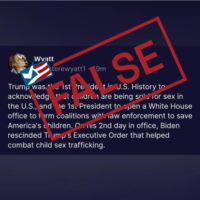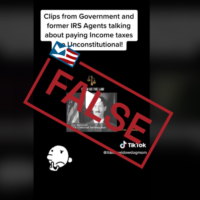Social media posts make the unfounded claim that the Heinous Crimes Court in the Philippines issued a warrant for Bill Gates’ arrest for “‘premeditated murder’ linked to vaccine roll out.” That court no longer exists, and a spokesperson for Gates told us there is no warrant for his arrest.
Debunking Viral Claims
FactCheck.org is one of several organizations working with Facebook to debunk misinformation shared on the social media network. We provide several resources for readers: a guide on how to flag suspicious stories on Facebook and a list of websites that have carried false or satirical articles, as well as a video and story on how to spot false stories.
Post Distorts History of Presidential Efforts to Fight Child Sex Trafficking
Efforts to stop child sex trafficking in the U.S. have been underway for decades, led by presidents including Joe Biden. But an Instagram post makes the false claims that former President Donald Trump was the first to “acknowledge that children are being sold for sex in the U.S.” and that Biden “rescinded” a Trump order addressing the problem.
Posts Mislead on Legal Basis for Paying Federal Income Taxes
Liberal Group’s Meme Mentions Nonexistent GOP Vote to Raise Social Security’s Retirement Age
A Republican Study Committee task force released a budget last year proposing to raise the full retirement age to 70 for some future Social Security beneficiaries. There was no vote on the plan, but a liberal group’s viral meme incorrectly claimed “156 congressional Republicans … just voted to RAISE the retirement age to 70.”
Social Media Posts Misrepresent Zelenskyy’s Remarks on U.S. Military Involvement
Ukrainian President Volodymyr Zelenskyy predicted that if Russia’s invasion of his country is successful, it will invade nearby NATO countries, triggering a war involving the U.S. military. Some conservative commentators misleadingly claimed that he’d called upon the U.S. to “send their sons and daughters to war for Ukraine and potentially die.”
NTSB Chair Contradicts Posts That Wrongly Claim Trump to Blame for Ohio Train Wreck
The National Transportation Safety Board’s chair said an Obama-era rule the Trump administration nixed would not have prevented the derailment of a train in Ohio, as some partisan commentators inaccurately claim. The rule requiring a new electronic braking system for certain trains carrying hazardous cargo did not apply to that train.
Multiple Federal Agencies Supporting East Palestine, Contrary to Partisan Claims
The people affected by the train derailment in East Palestine, Ohio, do not qualify for direct financial aid from the Federal Emergency Management Agency. But FEMA and other federal agencies have been assisting since the accident there in early February. Social media posts have misleadingly claimed that the federal government has denied aid.
Posts Distort Soros’ Comments on a DeSantis Candidacy
Billionaire George Soros said Florida Gov. Ron DeSantis “is likely to be the Republican candidate” in the 2024 presidential race. But social media posts edited Soros’ remarks to falsely claim he endorsed the governor. Soros’ full remarks show that he does not support DeSantis for president and that he hopes for “a Democratic landslide.”
Commentators Push Unfounded Claims About Ohio Train Derailment
The derailment of a freight train carrying toxic chemicals in eastern Ohio has sparked a slew of unfounded claims by conservative commentators. There’s no indication that this incident will rise to the level of a “domestic Chernobyl”; it has been covered steadily by the media; federal and state agencies are monitoring air and water quality and its impact on people and animals.
Posts Misinterpret Zelensky Quote on ‘Preventive Actions’ Against Russia
Responding to a question on what NATO could do to deter Russia’s nuclear threat, Ukrainian President Volodymyr Zelensky said NATO and its allies should use “preventive actions” against Russia. But the Kremlin and social media posts have misquoted Zelensky, claiming he referred to nuclear strikes when he was referring to economic sanctions against Russia.









